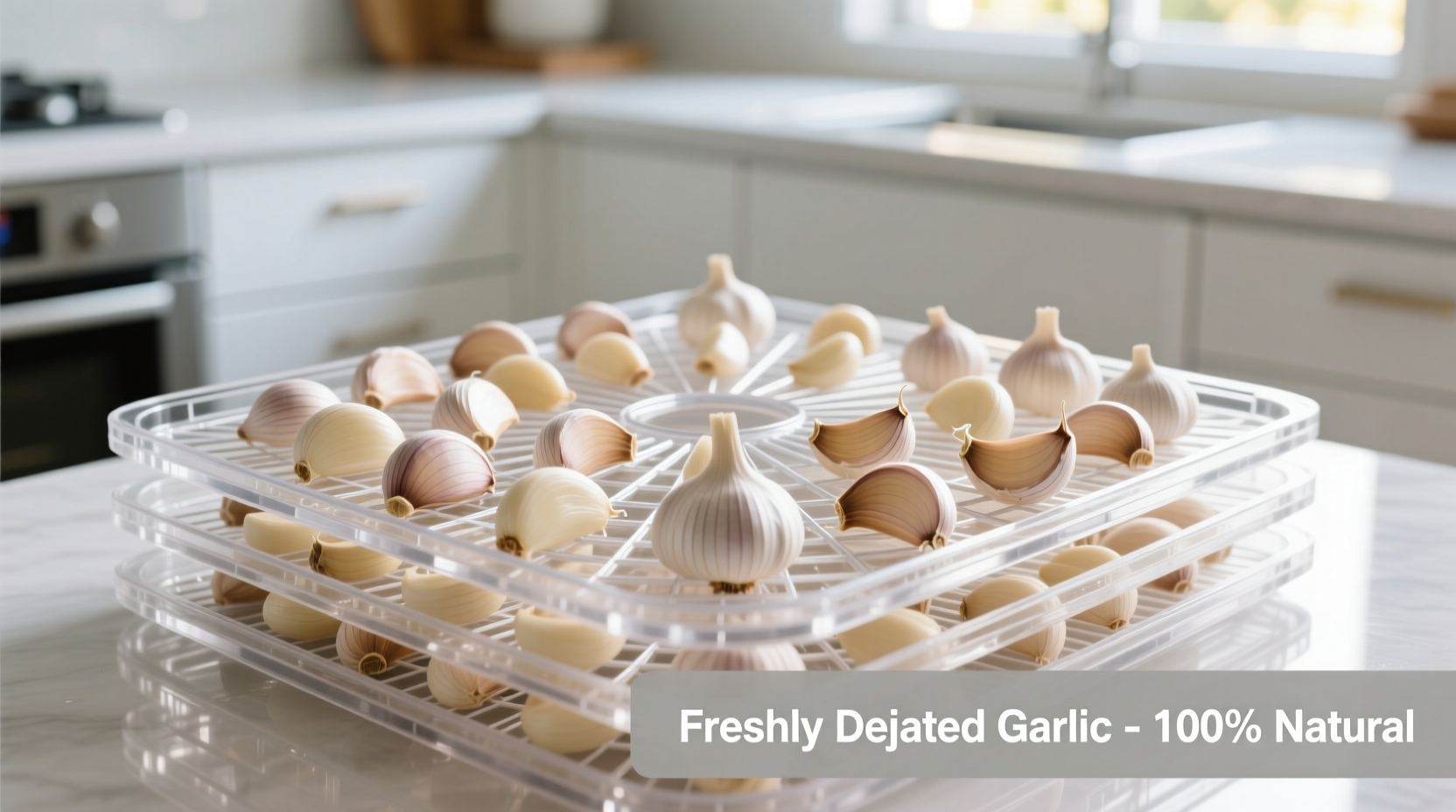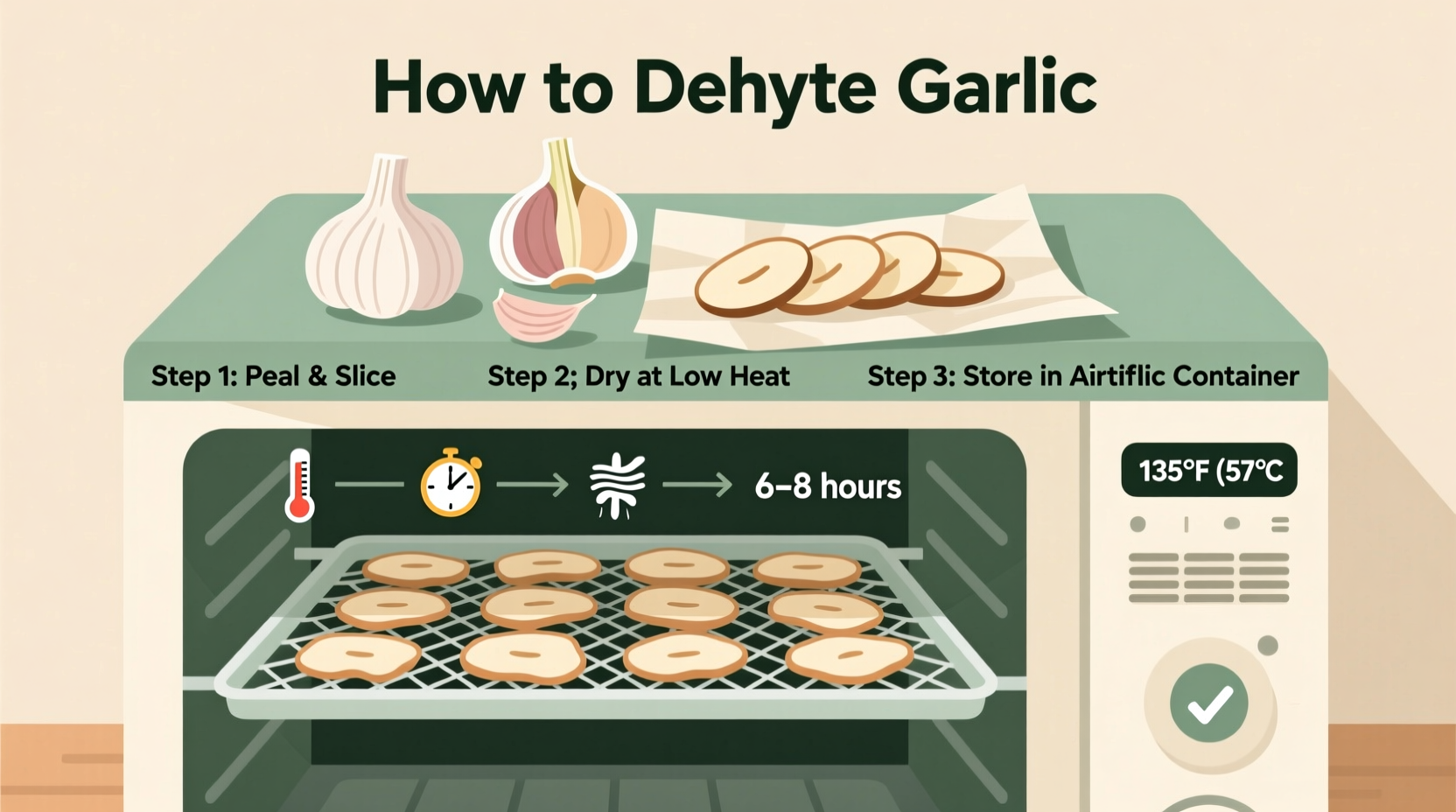Dehydrating garlic preserves its flavor for up to a year while concentrating its taste. The most effective methods include using a food dehydrator (135°F for 8-12 hours), oven drying (170°F for 2-4 hours), or air drying (2-3 weeks). Properly dehydrated garlic should be brittle with no moisture remaining, stored in airtight containers away from light and heat.
Preserving garlic through dehydration transforms your kitchen staples into versatile, shelf-stable ingredients. Whether you've harvested an abundant crop or scored a great deal at the market, learning how to dehydrate garlic properly ensures you'll have intense flavor available year-round without spoilage. This comprehensive guide walks you through every step of the process with professional techniques that guarantee optimal results every time.
Why Dehydrate Garlic Instead of Other Preservation Methods?
While canning and freezing maintain garlic's fresh characteristics, dehydration offers unique advantages for home cooks and professional chefs alike. Dehydrated garlic concentrates flavor up to ten times stronger than fresh cloves, requires minimal storage space, and eliminates the risk of botulism associated with oil preservation. According to the National Center for Home Food Preservation, properly dried garlic maintains nutritional value while becoming significantly more shelf-stable than alternative preservation methods.

Comparing Garlic Dehydration Methods: Which Works Best for You?
| Method | Temperature | Time Required | Flavor Preservation | Best For |
|---|---|---|---|---|
| Food Dehydrator | 135°F (57°C) | 8-12 hours | Excellent | Large batches, consistent results |
| Oven Drying | 170°F (77°C) | 2-4 hours | Good | Quick processing, small batches |
| Air Drying | Room temperature | 2-3 weeks | Fair | Traditional method, no equipment needed |
Step-by-Step Guide to Perfectly Dehydrated Garlic
Preparation: Selecting and Prepping Your Garlic
Start with firm, plump garlic bulbs free from blemishes or soft spots. Separate cloves and remove the papery skins. For powder production, slice cloves paper-thin using a mandoline for uniform thickness. For garlic flakes, quarter or slice cloves to 1/8-inch thickness. The University of Minnesota Extension recommends blanching garlic for 30 seconds in boiling water followed by immediate ice bath immersion to preserve color and deactivate enzymes that cause browning during drying.
Dehydrator Method: The Most Reliable Approach
Arrange prepared garlic in single layers on dehydrator trays, ensuring pieces don't touch. Set temperature to 135°F (57°C) and dry for 8-12 hours. Check periodically after 6 hours - properly dehydrated garlic should snap cleanly when bent, not bend or show moisture. Rotate trays hourly for even drying. This low-temperature method preserves maximum allicin content, the compound responsible for garlic's health benefits, according to research published in the Journal of Food Science.
Oven Drying: A Practical Alternative
Preheat your oven to its lowest setting (typically 170°F/77°C). Place garlic on parchment-lined baking sheets in single layers. Prop the oven door open 2-3 inches using a wooden spoon to allow moisture escape. Dry for 2-4 hours, checking every 30 minutes after the first hour. Stir pieces occasionally for even drying. Oven drying works faster but requires more attention to prevent scorching.
Air Drying: Traditional Technique for Patient Preservers
For this method, braid unpeeled garlic stalks or place peeled cloves in mesh bags with good air circulation. Hang in a dark, well-ventilated area with temperatures between 60-80°F (15-27°C) and humidity below 60%. Complete drying takes 2-3 weeks. Check weekly for mold or soft spots. This traditional method preserves complex flavor compounds but requires ideal environmental conditions.
Proper Storage: Maximizing Shelf Life of Dehydrated Garlic
Storage conditions dramatically impact how long your dehydrated garlic maintains quality. The critical factors include:
- Air exposure - Use airtight containers with oxygen absorbers
- Light exposure - Store in opaque containers or dark cabinets
- Temperature - Keep below 70°F (21°C) for optimal preservation
- Moisture - Include silica gel packets to absorb ambient humidity
When stored properly, dehydrated garlic maintains peak quality for 6-12 months. Garlic powder typically has a shorter shelf life (6 months) compared to larger pieces (12 months) due to increased surface area exposure. The USDA recommends checking stored garlic monthly for any signs of moisture reabsorption or spoilage.
Culinary Applications: Using Your Dehydrated Garlic
Dehydrated garlic offers unique advantages in cooking that fresh garlic can't match. Reconstitute flakes by soaking in warm water for 15 minutes before use, or add directly to soups and stews where liquid is present. For immediate flavor impact, grind into powder using a spice grinder. Professional chefs often create garlic-infused oils by steeping dehydrated garlic in warm oil for 20 minutes, then straining - this method avoids the botulism risks associated with fresh garlic in oil.
Troubleshooting Common Dehydration Issues
Problem: Garlic turns brown during drying
Solution: Temperature is too high or pieces are too thick. Reduce temperature and ensure uniform slicing.
Problem: Garlic feels leathery instead of brittle
Solution: Incomplete drying. Return to dehydrator for additional 2-4 hours and check moisture content.
Problem: Mold appears during storage
Solution: Insufficient drying or moisture intrusion. Discard affected batch and improve drying time or storage conditions for future batches.
Advanced Techniques for Flavor Enhancement
For gourmet applications, try these professional techniques:
- Add a pinch of citric acid before drying to preserve brighter color
- Combine with herbs like rosemary or thyme during dehydration for infused flavors
- Create garlic salt by dehydrating garlic with coarse sea salt in a 4:1 ratio
- Make garlic powder with added nutritional yeast for umami-rich seasoning
These methods transform basic dehydrated garlic into signature ingredients that elevate your cooking beyond standard store-bought versions.











 浙公网安备
33010002000092号
浙公网安备
33010002000092号 浙B2-20120091-4
浙B2-20120091-4